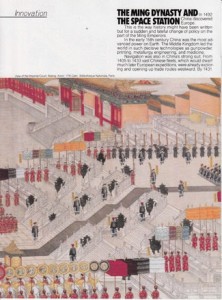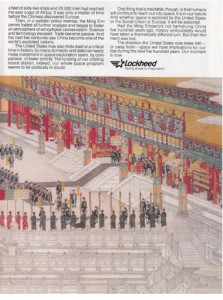An Aerospace Company
Advertisement
Vocabulary
| way (2) | advanced | fate/fateful |
| fleet | decisive (2) | Middle Kingdom |
| suit (2) | navigation | metallurgy |
| vast | gunpowder | human nature |
| route | expedition | only a matter of time |
| voyage | defense | xenophobia |
| foster | further (2) | atmosphere (2) |
| decay | exploit | conservative |
| defense | critical | implication |
| space | priority | inevitable |
| doubt | dwarf (2) | hamstring/hamstrung |
| turn (2) | dramatically | moment was lost |
| fate | domestic |
This magazine advertisement was printed in 1989 by Lockheed, a US airplane and aerospace company.
In 1492 China discovered Europe.
This is the way history might have been written but for a sudden and fateful change of policy on the part of the Ming Emperors.
In the early 15th century China was the most advanced power on earth. The Middle Kingdom led the world in such decisive technologies as gunpowder, printing, metallurgy, engineering, and medicine.
Navigation was also in China’s strong suit.
From 1405 to 1433 vast Chinese fleets, which would dwarf much later European expeditions, were already exploring and opening up trade routes westward.
By 1431 a fleet of sixty-two ships and 28,000 men had reached the east coast of Africa.
It was only a matter of time before the Chinese discovered Europe.
Then, in a sudden policy reversal, the Ming Emperors halted all further voyages and began to foster an atmosphere of xenophobic conservatism.
Science and technology decayed. Trade became passive.
And the next five centuries saw China become one of the world’s exploited nations.
The United States now also finds itself at a critical time in history.
So many domestic and defense needs make investment in space exploration seem, by comparison, of lower priority.
One thing that is inevitable, though, is that humans will continue to reach out into space.
It is in our nature.
And whether space is explored by the United States or someone else, it will be explored.
Had the Ming Emperors not hamstrung China five hundred years ago, history undoubtedly would have taken a dramatically different turn.
But their moment was lost.
The direction the United States now takes into—or away from—space will have implications for our fate during the next five hundred years.
Our moment is now.
Lockheed
Questions
793. In 1492, China discovered Europe, or China might have or could have discovered Europe.
800. Was England the most advanced country in the world in the early 1400s?
1066. What happened between 1405 and 1433?
1095. Did the Chinese continue large-scale maritime exploration and trade? Why didn’t they continue?
1215. What happened in the following centuries?
1298. What is the moral or lesson of this historical event, according to the writer?
1347. According to the text, is the United States in a similar situation? If yes, how is it in a similar situation?
1381. What does the writer suggest the US do? What should the United States do?
1429. Who wrote this article? Why did the person write this?
1453. What might have been the reasons why the Ming Emperor halted large-scale maritime expeditions?
1492. What would or might have happened if the Ming Emperor and his advisers had continued to support the maritime expeditions?
1517. How might Chinese people feel about the Treasure Voyages?
1529. What do Westerners think about the Treasure Voyages?
1543. Was it good, bad, both, neither that the Europeans — not the Chinese — colonized most of the world?
1610. Is there a moral or lesson to this historical event?


